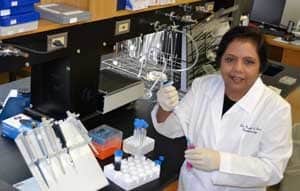Bora Awarded $1.1 Million NIH Grant for Uveitis Research
| Nov. 27, 2012 | Nalini Bora, Ph.D., director of research for the Pat & Willard Walker Eye Research Center, was awarded a three-year, $1.1 million National Institutes of Health grant to study an inflammatory disease of the eye that causes 20 percent of all blindness.
Bora, also vice chair for research in the UAMS College of Medicine’s Department of Ophthalmology, and her research team will use the grant to work toward an effective and safe treatment for idiopathic anterior uveitis (IAU).
IAU is a specific and most common form of anterior uveitis, which is an inflammation of the middle layer of the eye that includes the iris and nearby tissue, known as the ciliary body. When left untreated, it can lead to permanent damage and loss of vision from the secondary development of glaucoma, cataract or retinal edema.
“Uveitis is an inflammatory disease of the eye, responsible for up to 20 percent of all blindness,” Bora said. “Most uveitis patients recognize symptoms and seek treatment at an age where they are in the most active period of their working life. This makes uveitis an ocular disease with an important socioeconomic impact, since it can be very debilitating.”
The management of patients with IAU remains a significant challenge because no specific treatment is available for this disease. It is now treated by simply trying to alleviate symptoms, with therapies such as steroid and immunosuppressive agents, instead of attacking the specific cause. Unfortunately, Bora said, these treatments do not address the underlying mechanisms and are associated with adverse side effects. Also, prolonged immunosuppression results in increased discomfort in patients. Bora’s group has been studying IAU for nearly two decades and has already identified the protein associated with the cause of IAU, but further study is needed for more specific identification of the disease-causing peptides.
Bora believes that the molecular and therapeutic insights in IAU will become clearer in the studies resulting from this grant.
“This grant will facilitate the development of novel, effective and safe antigen-based therapies for this vision-threatening disease,” Bora said. |
